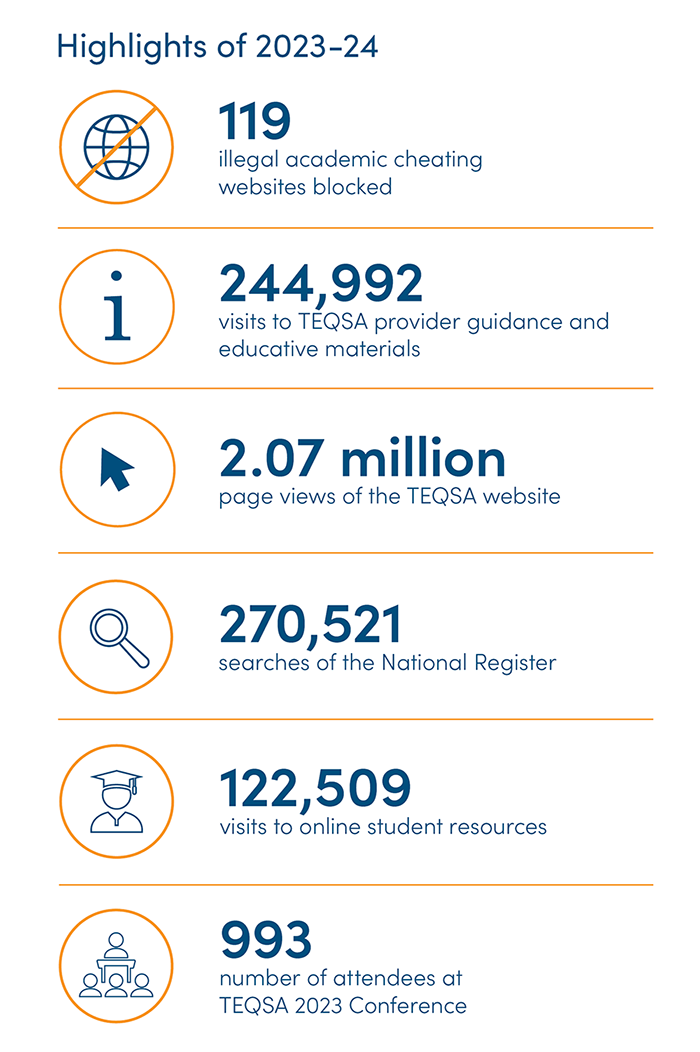We’re supporting Australian higher education providers and working with overseas quality assurance agencies to uphold academic integrity and address the risks posed by commercial academic cheating services.
This page brings together TEQSA’s academic integrity resources for providers, academics and professional staff, as well as information about Australia’s anti-commercial academic cheating laws and international resources.
You can use this form to report a suspected academic cheating service.
Resources
TEQSA Masterclass: contract cheating detection and deterrence
This free masterclass is designed to help academics and professional staff improve their ability to prevent, identify and investigate suspected cases of contract cheating (also known as commercial academic cheating).
Academic integrity toolkit
Includes a guide to substantiating when contract cheating occurs, benchmarking tools, advice on policy and case studies from Australian higher education providers.
Good Practice Note: Addressing contract cheating to safeguard academic integrity
Advice and examples for providers about upholding academic integrity while addressing commercial academic cheating.
Guidance note: Academic and research integrity
Outlines the relevant standards and what TEQSA will consider when conducting an assessment as part our registration or re-registration process.
Understanding academic integrity (for students)
TEQSA-developed resources for students, including translated information and materials to support communications with students.
Academic integrity in the creative arts
Advice for providers and academics in the creative arts on strengthening and upholding academic integrity.
Substantiating contract cheating for symbol-dense, logical responses: A guide for investigators
Outlines how academics can identify contract cheating in symbol dense fields and includes an investigations checklist and questions for investigators.
Contract cheating
Information to support the Academic Integrity Toolkit and Good Practice Note to address the risks posed by contract cheating (also known as commercial academic cheating).
Academic integrity experts advice hub
Articles from experts in the field for providers, academics and professional staff.
Predatory conferences: A to Z elements
Tips to avoid predatory conferences.
- Predatory conferences: A to Z elements (PDF, 127 KB)
Predatory publishing: A to Z elements
Tips for research students and early career researchers to avoid predatory journals.
- Predatory publishing: A to Z elements (PDF, 132 KB)
3 Ps: International Day of Action for academic integrity
Higher education good practice hub
Brings together resources and information on a range of topics, including artificial intelligence and assessment design, to support good practice across the sector.
Information about Australia’s anti-commercial academic cheating laws
- Tertiary Education Quality and Standards Agency Amendment (Prohibiting Academic Cheating Services) Bill 2019
- Fact sheet about the Prohibiting Commercial Academic Cheating Services Bill (2019) (PDF, 65 KB)
- Blocked commercial academic cheating websites
- Report a suspected commercial academic cheating service
International resources
Global Academic Integrity Network (GAIN)
TEQSA is a co-founder of this consortium of international education quality and integrity agencies that is fighting the rise of commercial academic cheating services targeting students.
Toolkit to support quality assurance agencies to address academic integrity and contract cheating
This toolkit was developed to share Australia’s lessons with our colleagues at international quality assurance agencies.

